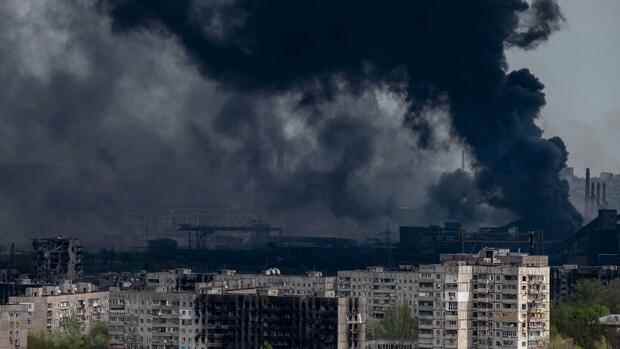In the night of Tuesday, Russia is said to have flown several attacks on the steel mill.
(Photo: IMAGO/SNA)
Dusseldorf More than 100 people from the Azovstal steel plant in Mariupol, which was besieged by the Russian army, have reached the city of Zaporizhia. The International Committee of the Red Cross (ICRC), which accompanied the convoy of refugees on Tuesday together with representatives of the United Nations, said some were injured.
According to the Red Cross, other people also left the steel mill and made their own way to other destinations. “It is a huge relief that some civilians who have suffered for weeks are now out,” said ICRC President Peter Maurer.
Over the weekend, more than 120 people had already been rescued from the factory premises with international help. 200 civilians are said to have stayed there until the end. More than 120 civilians had escaped over the weekend. Zaporizhia under Ukrainian control is about 230 kilometers northwest of Mariupol.
Russian troops apparently began storming the steelworks on Tuesday. Ukrainian media reported this, citing Ukrainian militants at the plant. Mariupol is largely destroyed and under Russian control. However, Ukrainian fighters have entrenched themselves in the steelworks.
Top jobs of the day
Find the best jobs now and
be notified by email.
On Tuesday, the newspaper “Ukrainska Pravda” quoted the deputy commander of the Ukrainian Azov regiment, Svyatoslav Palamar, as saying: “They bombed us from the air all night (…) and now Azovstal is being stormed.” Among the youngest Two civilians were also killed in Russian attacks.
The civilians made it out of Mariupol.
(Photo: IMAGO/Agencia EFE)
There was initially no official confirmation from the Russian side. The state news agency Ria Novosti, citing the Defense Ministry, reported that Azov fighters entrenched on the factory premises used a ceasefire to return to their firing positions. These would now be attacked with artillery and from the air.
Does Putin declare a state of war?
According to speculation in the US broadcaster CNN and several Ukrainian media, Russian President Vladimir Putin could declare a state of war in Russia and order general mobilization in just a few days. The head of Ukrainian military intelligence, Kyrylo Budanov, also spoke of Russian preparations for an open mobilization of soldiers and reservists. There is no evidence for this. So far, Russia has only officially propagated a “special operation” in Ukraine.
The Kremlin did not respond to the rumors for the time being. Many people are now looking forward to Putin’s speech at the traditional military parade on May 9 in Moscow, with which Russia commemorates the victory over Hitler’s Germany in 1945 every year. Observers believe that the fighting may intensify because the Russian troops are only making sluggish progress in their offensive in eastern Ukraine.
The Russian leadership cites the alleged “denazification” of Ukraine as one of its goals. This is one of the pretexts under which Putin launched the invasion of Ukraine. The goal causes outrage.
Because the Ukrainian President Volodymyr Zelensky is of Jewish descent. In addition, around 10,000 survivors of the German Holocaust live in Ukraine, some of whom even fled to Germany or even recently died from Russian shelling.
Putin imposes new retaliatory sanctions – EU prepares oil embargo
Russian President Vladimir Putin signed a decree on Tuesday for economic retaliatory sanctions against the West. The decree was a reaction to “unfriendly actions by certain foreign states and international organizations,” the President’s Office in Moscow said.
According to the decree, Russia bans the export of products and raw materials to persons and entities against which it has imposed sanctions. It also prohibits doing business with foreign individuals and companies affected by Russia’s retaliatory sanctions and allows Russian business partners to refuse to make commitments to them.
Details were not given. According to the information, the government now has ten days to create a list of sanctions with the names of affected people and companies.
At the same time, the EU Commission is preparing a proposal for another package of sanctions against Russia “including the exit from Russian oil”, as Federal Minister of Economics Robert Habeck (Greens) said. However, there are no signs of a joint approach by all EU countries regarding the planned EU oil embargo.
More Handelsblatt articles on the war in Ukraine
After Hungary, Slovakia also made it clear on Tuesday that the country was not ready for a quick halt to deliveries and could not do without Russian oil for the time being. Slovakia’s Economics Minister and Deputy Prime Minister Richard Sulik called for exceptional rules. Slovakia currently gets almost all of its oil from Russia.
Hungary, which is similarly dependent on Russian imports, had threatened to reject sanctions against current Russian oil and gas imports. It is possible that both countries could get an exemption with a longer transition period. Most recently, it was expected that the EU Commission would present its proposal for a new package of sanctions against Russia on Tuesday, but no later than Wednesday.
Germany had previously described an oil embargo as feasible. According to Habeck, the share of Russian oil in German oil consumption has fallen from 35 to 12 percent since the beginning of the war against Ukraine. Almost all of the remaining volume goes to the PCK refinery in Schwedt, which is operated by the Russian company Rosneft.
With agency material
More: You can follow the latest developments in our news blog
